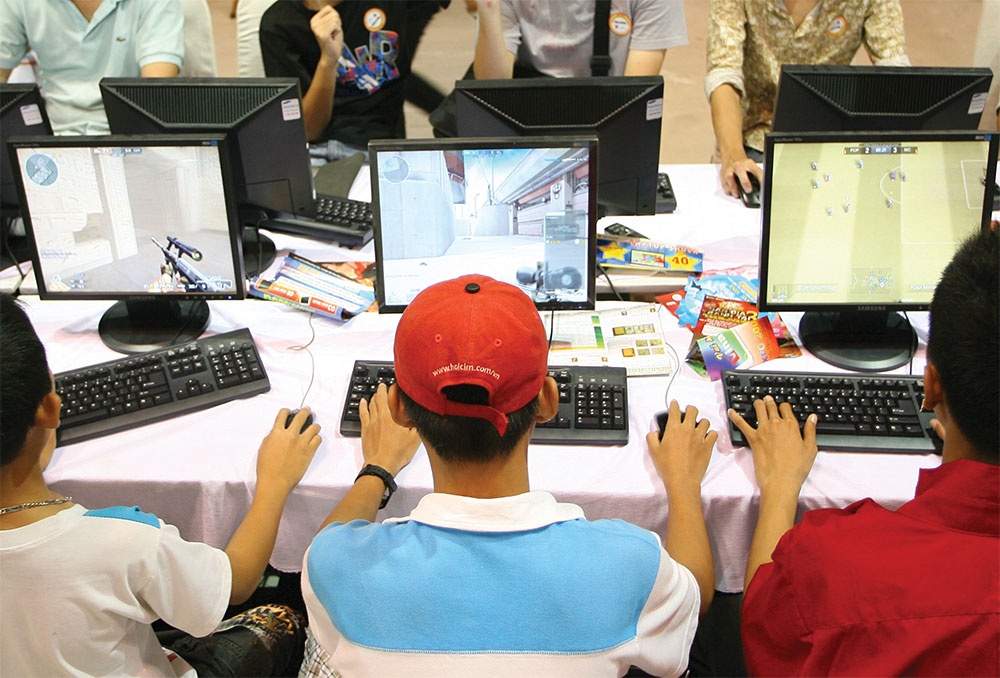Serious business ahead for gaming
 |
| Worldwide, online gaming is seeing double-digit growth and millions of Vietnamese play every day, photo Le Toan |
The Vietnam Game Awards 2023, which will take place at the end of March in Ho Chi Minh City, is a most anticipated event for businesses and game developers, as it will be the first official awards ceremony in Vietnam to honour organisations, individuals, and products that have made outstanding contributions in the field of video games, while also opening up opportunities to connect with domestic and foreign investment funds.
The event is an activity in a series for Vietnam GameVerse 2023, organised by the Vietnam Game Federation, to demonstrate that the field is being recognised as a potential key economic field for the future.
Le Quang Tu Do, deputy director of the Department of Broadcasting, Television and Electronic Information (BTEI) under the Ministry of Information and Communications (MIC), said, “Games are one of the rare fields of our country that can export digital content to the world and is a strength to focus on developing. We expect games to be a spearhead industry in digital transformation and development of Vietnam’s digital economy in the near future.”
The games market has been growing at a high rate, with the global market size valued at $220.79 billion in 2022. It is expected to expand at a compound annual growth rate of 12.9 per cent over the next year, according to data by grandviewreseach.com. Vietnam also has the highest percentage of adults aged 18-64 playing games on electronic devices in the world, the data showed.
According to statistics from the MIC, 28.4 million Vietnamese have played online games at one point or another. The popularity of digital games in Vietnam was also reflected in a report from We Are Social in 2022, with 92 per cent of Vietnamese people questioned said they had played games on at least one device. Smartphones accounted for 85 per cent, PCs 44 per cent, tablets 22.5 per cent, and consoles 8.6 per cent.
NewZoo’s global game market report from 2020 also assessed that Vietnam has great potential in gaming. At the time, Vietnam ranked seventh in the world and second in Southeast Asia in terms of game downloads. In addition, this country also ranked third in the top 10 game application manufacturers in the region. For every 25 games downloaded, one game has been produced in a Vietnamese studio.
However, the shape of Vietnamese-made online game products in the market is still foggy because game studios in Vietnam have mainly become an outsourcing address for major game publishers worldwide. Many top games are produced by Vietnamese staff such as Free Fire, Caravan War, Game 7554, I Squad, and Arena of Survivors, but are released under the name of foreign companies.
According to Nguyen Minh Quang, an engineer with more than 10 years of experience in game development, the absence of truly domestic game products is a pity. “The reason why Vietnamese online games are absent from the home field stems from the difference between domestic tastes and the core competencies and orientations of domestic studios,” Minh Quang said.
Quang explained that the production capacity of domestic game studios is still limited, especially in terms of scale. The level of technology and quality of human resources in the country cannot make products that can compete with imported games of the same type, he said.
In recent years, many studios in Vietnam have begun to achieve success internationally, such as Amanotes and Onesoft. However, the genres that Vietnamese people make and succeed with are mainly casual and hyper-casual games.
The high taxation, as well as the incomplete legal corridor for in-game payment activities, are limiting the potential for development, forcing businesses to register for establishment, set up headquarters, and call for capital from foreign markets.
According to regulations, games are not considered a priority industry in cultural development, and the current regulations are only related to the licensing and management of games, there are no specific policies to support the development of this industry, Quang added.
Software production enterprises are entitled to a 10 per cent tax reduction, but game enterprises that have just released software are not entitled to incentives because they are considered publishers.
Tu Do of BTEI insisted that state management agencies are currently adding regulations to promote the positive side of the video game industry. Some regulations may also be introduced to limit the negative side, helping the domestic video game industry to develop more.
“It is expected that additional legal provisions will be issued in the first half of 2023 at the level of government decree, tightening advice such as the amount of playing time in a day to no more than three hours for young people, and tightening up age classifications,” said Do.
The final bottleneck is the situation of illegal games, in the form of cross-border games that are not licensed to be released through the Apple Store and Google Play store, making domestic game publishers unable to compete. Revenues from pirated games account for about 30 per cent of the entire market, meaning that Vietnamese companies have to face unfair competition, a decline in revenues, and loss of customers.
Vietnam currently has nearly 200 domestic game publishing and production companies, according to data from the MIC. Games are categorised from G1 to G4, with G1 products offering high intellectual content and bringing the largest revenue. However, 88 per cent of G1 games in Vietnam come from abroad, making the top of the market a playground for foreign businesses.
Nevertheless, the introduction of technologies such as blockchain, crypto-assets, and virtual currency have opened up opportunities for the Vietnamese game market.
Nguyen Trung Thanh, head of Web 3.0 at the Vietnam Blockchain Association, said that new technologies such as these are creating a strong investment wave from market-making funds such as Sequoia and Pantera Captial, following a thriving gamefi community over the past three years. The application of such tech can also make in-game economies easier to connect with the outside world.
“However, in the early stages it was overly concerned and geared towards short-term finance, leading to games that did not invest enough in the player experience and entertainment, and the fast collapse of game business model,” Thanh said. “Many early-stage projects are heavily promoted and liquidity reaches tens of millions of dollars, but after a few months they can simply disappear.”
After a period of hot growth and then collapse, the market is now difficult, but it is an opportunity for products with a vision to develop from the ground up, Thanh added.
| Hadi Malaeb-CEO, Agora Group | |
Traditional sectors like real estate, agriculture, and infrastructure are vital for the economy. The fact that they are not receiving as much money as other sectors in the startup ecosystem is because most of these investments are not considered startups. A new building in Dubai, for example, is hardly a startup. These kinds of investments are tracked differently. There are no real barriers for other sectors to attract investments. As long as a startup has the right foundation of a good idea, a path to revenue, a solid management team, and the right valuation, then there are always investors willing to help. It is not only fintech investment that went down in 2022. It was a tough year for traditional investment and startups too. We are seeing encouraging signs at the beginning of 2023 with the opening up of China, the slowdown of inflation in the US, and a rebound in economic output in Europe. I believe all these factors will lead to a favourable outlook for investments in 2023, including a solid rebound for fintech. | |
| Quang Nguyen-CEO, MetaDOS | |
It is very difficult to make a good product and it needs a lot of effort, brainpower, and money. Investment by domestic game developers to create products with commercial value should be encouraged. Currently, there is a big gap between policy and local game developers. It is also tough to make a successful game, and the success rate is sometimes only a few per cent. Domestic studios have to face difficulties including lack of capital sources, high-quality human resources, and supportive policies for game production. In terms of advantage, Vietnam is currently the top game market in Southeast Asia in terms of both production capacity and market size. We have the best programmers with good quality and cheap prices on the continent. These are the basic advantages that give Vietnam great prospects in developing its game industry in the near future. During the peak of the game-fi trend, many studios were established to make games, which entailed many consequences when the cost of programmer personnel was pushed too high. Gamers and creators are often concerned with financial value rather than product quality, which affects the reputation of game studios. However, after the recent downturn, the game market is undergoing a natural screening process and seems to be returning to its inherent values, with only quality-focused studios surviving. This is the premise for us to believe in the success of the studios in the upcoming period of Vietnamese games. | |
| Phan Tung-Co-founder, Moon Knight Labs | |
Although Vietnam has facilitated a lot in simplifying game licensing regulations, the core issue is about capital. Game studios cannot keep up with the remarkable changes in technology and demanding users, becoming one of the bottlenecks to developing online games in Vietnam. Many studios do not dare to invest in making games that are too complicated, so only focus on simple, low-cost hyper casual games. Too many Vietnamese-made products fail. Only a few have been truly successful, such as Free Fire from 111dots Studio, which is backed by major international publisher Garena. Making international games, combining support from major publishers, is a way for Vietnamese online games to develop. However, this path is difficult. The emergence of blockchain accidentally answers the headaches of many small studios. The fundraising and disbursement process of blockchain projects is much faster than conventional forms of investment. This is the reason for the sudden development of blockchain games in 2020-2021 when a series of game studios successfully raised capital. In the near future, AI can replace many stages of game making, shorten production time, and optimise costs for businesses. Currently, Moon Knight Labs has also successfully researched the application of AI for the production of 2D games. We will soon launch this tool to general users and game developers. |
 | Legal bottlenecks must be resolved for Vietnam’s online gaming arena to win Online game product developers in Vietnam are facing many legal problems related to their activities. The first is that the current regulations on licensing procedures for online games are often very complicated and lengthy. |
What the stars mean:
★ Poor ★ ★ Promising ★★★ Good ★★★★ Very good ★★★★★ Exceptional
Themes: Digital Transformation
- PM sets five key tasks to accelerate sci-tech development
- Ho Chi Minh City launches plan for innovation and digital transformation
- Dassault Systèmes and Nvidia to build platform powering virtual twins
- Sci-tech sector sees January revenue growth of 23 per cent
- Advanced semiconductor testing and packaging plant to become operational in 2027
Related Contents
Latest News
More News
- Ho Chi Minh City launches plan for innovation and digital transformation (February 25, 2026 | 09:00)
- Myriad risks ahead, but ones Vietnam can confront (February 20, 2026 | 15:02)
- Vietnam making the leap into AI and semiconductors (February 20, 2026 | 09:37)
- Funding must be activated for semiconductor success (February 20, 2026 | 09:20)
- Resilience as new benchmark for smarter infrastructure (February 19, 2026 | 20:35)
- A golden time to shine within ASEAN (February 19, 2026 | 20:22)
- Vietnam’s pivotal year for advancing sustainability (February 19, 2026 | 08:44)
- Strengthening the core role of industry and trade (February 19, 2026 | 08:35)
- Future orientations for healthcare improvements (February 19, 2026 | 08:29)
- Infrastructure orientations suitable for a new chapter (February 19, 2026 | 08:15)




 Tag:
Tag:



















 Mobile Version
Mobile Version